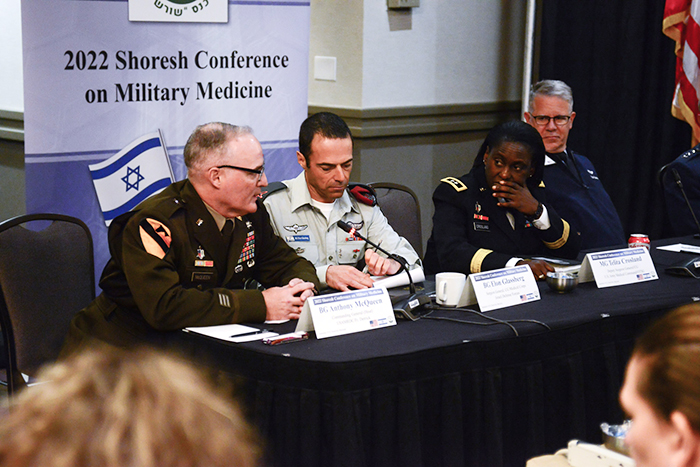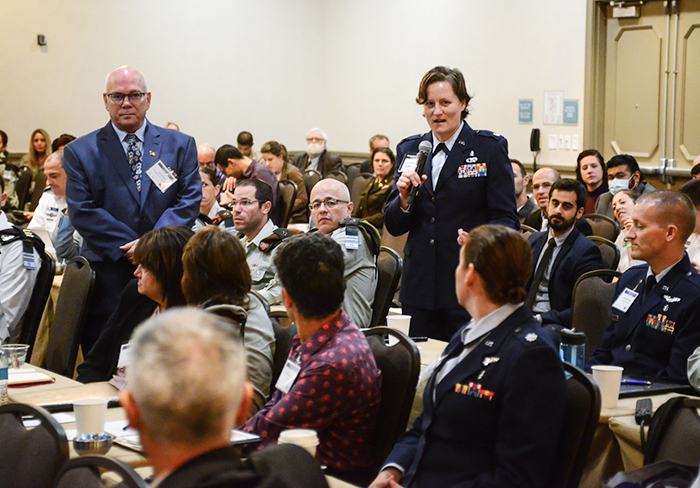20th Shoresh Meeting Begins with Focus on Key Threats, Modernization

Soldiers and scientists with the U.S. Army Medical Research and Development Command and the Israel Defense Forces gathered for the 20th Shoresh Conference on Military Medicine on September 19 in Maryland. The biennial event is designed to facilitate collaboration on key topics integral to the advancement of military medicine; allowing representatives from both countries an opportunity to exchange ideas and identify potential solutions for pressing issues related to Soldier and force health.
During a keynote address to the crowd – which included a number of key leaders from across the U.S. Department of Defense – Brig. Gen. Tony McQueen, Commanding General of USAMRDC and Fort Detrick, made clear the overarching goal of the meeting was to focus on sharpening medical readiness plans in ways that dovetail with both countries' burgeoning modernization requirements.
"We live in an era of increased threats and changing landscapes," said McQueen, who by rule served as Head of the U.S. Delegation, regarding the current geopolitical climate facing both nations. "Collaborations like these help our forces stay engaged in an uncertain era – which is why I'm so confident that our collaboration this week will advance the cause of military health."
The event included hundreds of scientific presentations and a number of speakers over the course of the week. The material itself was divided into eight separate modules, each with its own dedicated working group consisting of scientists and researchers specific to that topic. Subject areas included chemical and biological threats, infectious diseases, combat casualty care, naval medicine and aerospace medicine, among others.
A recurring theme in the opening remarks from both USAMRDC and IDF leaders was the inherent value military medical research supplies to both military and civilian populations. At the same time, leaders were quick to stress the importance of becoming more efficient with respect to medical product development, noting that future combat operations – whenever and wherever they may occur – may require a more rapid process than is currently in place.

"In this modern age, we do not have the luxury of developing knowledge just for the sake of knowledge," said Brig. Gen. Elon Glassberg, IDF Surgeon General, during the event's opening session. "We do not have the time, effort, patience or money to focus on what doesn't work."
To that end, IDF leaders spent substantial effort noting the personal importance of Shoresh – which first began in 1978 – to the Israel military and the country as a whole. According to Glassberg, only about 30 percent of the IDF Medical Corps – which, for perspective, is similar in scope to the Army Medical Corps – are professional military members, with the rest being younger conscripted Soldiers. As such, turnover rates are high as many Soldiers serve their required time within the IDF and then leave the service. That results in an organization constantly seeking to smooth and refine learning techniques and clinical practice guidelines in order to pass on knowledge and best practices. However, the fact that the IDF is only a fraction of the size of the U.S. military – as Glassberg notes, the entire country of Israel could fit inside Lake Michigan – allows it to be a more agile organization, allowing for faster approval and adoption of tools and techniques.
"We're early adopters – we have no other choice," said Glassberg, noting that the IDF contingent at this year's event was the largest ever, with a number of young IDF officers in the delegation. "The sense of urgency is strong within us, within our entire organization."
Similarly, DHA leaders in attendance stressed that same concept of urgency as integral to aiding overall modernization efforts for the larger U.S. military. Experts predict Warfighters will likely have to contend with an array of new combat casualty care techniques and behavioral health challenges – to name only a few – on the future battlefield; issues compounded by a likely lack of air superiority in contested areas, thus impacting medical evacuation efforts and times.
"We don't have the benefit of knowing when the next conflict will take place, so we have to be prepared," said Brian Lein, DHA assistant director, who was attending his fourth Shoresh meeting. "The things we talked about four or six years ago are now saving American and Israeli lives based on innovation first developed here."
Outside of pressing gaps in medical care, Shoresh also focused on emerging trends in health care and research, including technology and data collection, economic trends and chronic issues. Glassberg referred to these areas as key to a coming 'decade of disruptive change' in military medical research. USAMRDC leadership agreed that such a focus will be critical to the continued to health and readiness of both forces.
"It's the forward-thinking minds that will allow us to stay ahead of the threat we face in the future," said McQueen, in closing. "The work we do here will save lives."
 An official website of the United States government
An official website of the United States government
 ) or https:// means you've safely connected to the .mil website. Share sensitive information only on official, secure websites.
) or https:// means you've safely connected to the .mil website. Share sensitive information only on official, secure websites.


